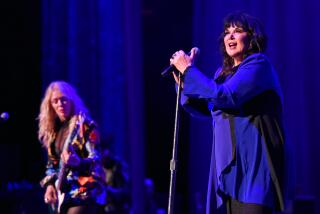CRENSHAW : Group Eases Burden of Cancer Patients
- Share via
Patsy Harris, a vigorous woman who works nearly nonstop, remembers when life seemed too tenuous to think past expiration dates on credit cards.
“I couldn’t even bear to look at my driver’s license. I figured I probably wouldn’t make it four years,” recalled Harris, 46, a Crenshaw district resident. “I was out of the hospital and seemed OK. But other, emotional, problems were just beginning.”
Two-and-a-half years later, Harris is president of Sisters Breast Cancer Survivors Network, a support service group that tends to the day-to-day needs of women living with--and dying from--breast cancer.
Though most of its members are African American, the group is open to all women who are struggling to regain some normalcy after having their lives capsized by the disease. Harris and a core group of nine volunteers work almost daily to ease the psychological burdens of patients--many of whom are single, unemployed and underinsured. Many are residents of the Central City.
“We try and demystify a lot of things for them,” explained Harris, whose group meets for monthly support sessions at a Hawthorne church. “The difference between a lumpectomy and a mastectomy, what drugs are involved in chemotherapy, where to order prostheses. Surgery is actually the easiest part. People pat you on the back after you get out of the hospital and say, ‘You’re going to be fine.’ That’s not true.”
Network member Kay Powell, a five-year cancer survivor who works closely with Harris, said working with women “in the trenches” has created a life-sustaining bond.
“There’s such a need for dealing with patients after surgery and after treatment. That’s the emotional part,” said Powell, a South-Central resident.
“We help each other deal with husbands, children, grocery shopping. We’re there with them in a way doctors and hospitals can’t be.”
During a typical week, Harris and others shuttle patients to and from hospitals, cook and deliver meals to women, find cleaning help and ease newly discharged patients into new routines of living with tubes, drug therapy and physical and emotional scars.
Such changes, said Harris, are very difficult for women accustomed to independence.
“Women--particularly black women--are so used to being the strong one, the provider, the caretaker,” said Harris, who frequently gets late-night calls from distraught patients. “We’re there to tell them, ‘It’s OK not to wash clothes today. It’s OK not to cook or clean.’ ”
The nonprofit Sisters network is a spinoff of Women of Color, a similar support group run out of Daniel Freeman Memorial Hospital in Inglewood. Harris and her core group, who comprised the outreach component of that organization, broke away and formed their own independent group in January.
“Women of Color strictly served black women. We wanted to include all women, although our focus is black women,” Harris explained.
The Sisters network is looking to set up community locales at such sites as the Crenshaw YWCA and Martin Luther King Jr.-Drew Medical Center. Through King-Drew, the group is working to establish a database that can keep members informed about breaking news, issues and research about breast cancer.
Not all of the issues the network addresses are weighty. Recently, 27 of its members proudly displayed plaster versions of their torsos during a weekend exhibit at the Federal Building in Westwood. The event was the Los Angeles Breast Cancer Alliance’s annual kickoff of national Breast Cancer Awareness Month in October.
“Our casts really stood out because they were brown, not white,” said Harris, smiling. “That hadn’t been done before. It’s just one way we get back a sense of empowerment.”
Information: (213) 293-9408.
More to Read
Sign up for Essential California
The most important California stories and recommendations in your inbox every morning.
You may occasionally receive promotional content from the Los Angeles Times.













